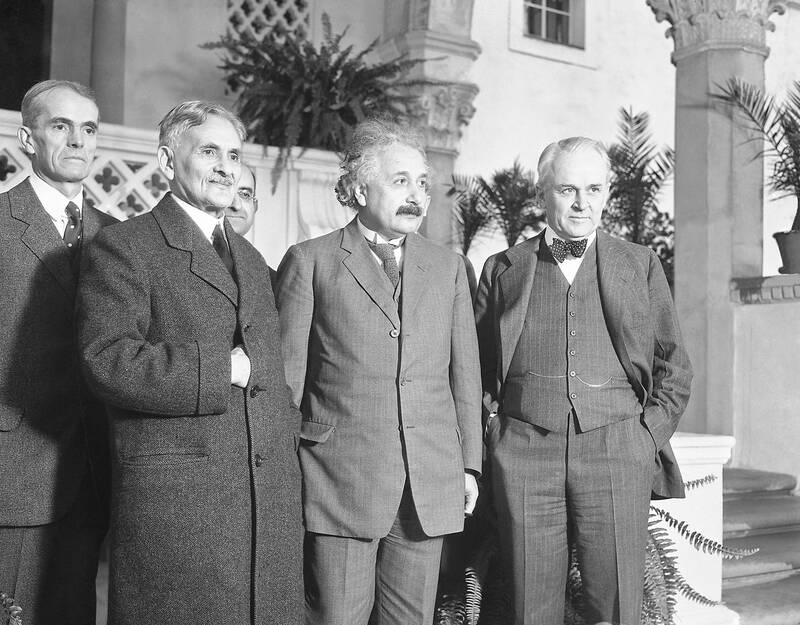In September 1933, a humble wooden hut on a secluded Norfolk heath became the improbable location of one of the most important hideouts in history.
Nearly a century later, the rarely told story of the three weeks Albert Einstein spent holed up in a heathland bothy, on the run from Nazi assassins, has been turned into an unusual type of docudrama.
Using Einstein’s own words, Netflix’s Einstein and the Bomb will shine a light on how the celebrated German Jewish scientist’s brief sojourn on Roughton Heath came at a crossroads in his life — and, consequently, changed the course of history.

Photo: AP
“It was only as we looked closer that we realized quite what a seismic moment in his life it was,” said the screenwriter Philip Ralph, a “verbatim specialist” who used only Einstein’s actual speeches, letters and interviews to script the theoretical physicist’s dialogue.
“What came out from my research was that it was, in many ways, the most important turning point in Einstein’s life.”
By then, Einstein was public enemy No 1 in Germany. In May 1933, a brochure entitled Jews Are Watching You accused Einstein of “lying atrocity propaganda against Adolf Hitler.” Under his picture, it stated: “Not yet hanged.”

Photo: AP
In September, after German secret agents assassinated the Jewish philosopher Theodor Lessing in Czechoslovakia, the Nazis — who had already stolen Einstein’s savings, raided his summerhouse, ransacked his Berlin apartment and taken his violin — offered a reward of at least £1,000 (US$1,254) for his murder.
The next day, Einstein yielded to his wife Elsa’s pleas to leave her in the holiday home they had been renting near Ostend in Belgium and flee to England by sea. He would never set foot on continental Europe again.
“Prior to that point, Einstein had been an avowed, passionate advocate for non-violence and pacifism. But at the end of that three weeks, he gave a speech to 10,000 people at the Royal Albert Hall where he effectively said there is an existential threat to European civilization, and we will have to fight it,” said Ralph.
In 1939, fearing that the Nazis would get there first, he successfully petitioned President Franklin Roosevelt to accelerate the US development of a nuclear bomb, a decision recently depicted in Christopher Nolan’s blockbuster film Oppenheimer.
It was during Einstein’s stay on the remote heath, protected by armed guards, that he first came to the realization that he must publicly use his influence in society to speak out against the Nazis and call on world leaders to act, Ralph said.
“We chose the title Einstein and the Bomb because it was the shift in his thinking that took place over that three-week period in Norfolk that directly led him to put his name to that letter to Roosevelt.”
The small Norfolk bothy belonged to a trusted acquaintance, the anti-fascist Conservative MP and first world war naval commander Oliver Locker-Lampson, who offered it to Einstein as a place of refuge under his protection.
Earlier that year, Locker-Lampson had highlighted Einstein’s situation in parliament and introduced an ultimately unsuccessful private member’s bill to “extend opportunities of citizenship for Jews resident outside the British empire.”
Perhaps to draw attention to Einstein’s plight, members of the press were somewhat incongruously invited by Locker-Lampson to the secret hideout and allowed to interview and photograph the famous Nobel prizewinner.
It was a press call that, given the very real threat to Einstein’s life, appalled a reporter at the Observer. “England is not a very good place to hide in,” the newspaper’s diarist reported on 17 September 1933. “Dr Einstein, who has come here to escape Nazi persecution, finds his wooden hut photographed in the papers, with full indications of locality, and Cromer Council considers the question of presenting an address. Germany, I suppose, is presumed to be looking the other way.”
When Einstein agreed to give the speech at a ticketed event at the Royal Albert Hall to raise money for Jewish academic refugees from Germany, his decision was criticized by the Daily Mail. The editorial, which claimed to pity and “have every sympathy with the German Jews as such”, called on Einstein to “stop this injudicious agitation in this country against the Nazi regime”.
Two days after giving his historic speech, calling on all nations to “resist the powers that threaten intellectual and individual freedom … which our forefathers won through bitter struggle”, Einstein left for the US and the newly formed Institute for Advanced Study in Princeton University. Elsa successfully joined him en route and he spent the rest of his life in exile, where he wrote affidavits recommending the US offer visas for Jews fleeing Nazi persecution and helped to found the world’s first refugee aid agency, the International Rescue Committee.

Jacques Poissant’s suffering stopped the day he asked his daughter if it would be “cowardly to ask to be helped to die.” The retired Canadian insurance adviser was 93, and “was wasting away” after a long battle with prostate cancer. “He no longer had any zest for life,” Josee Poissant said. Last year her mother made the same choice at 96 when she realized she would not be getting out of hospital. She died surrounded by her children and their partners listening to the music she loved. “She was at peace. She sang until she went to sleep.” Josee Poissant remembers it as a beautiful

March 2 to March 8 Gunfire rang out along the shore of the frontline island of Lieyu (烈嶼) on a foggy afternoon on March 7, 1987. By the time it was over, about 20 unarmed Vietnamese refugees — men, women, elderly and children — were dead. They were hastily buried, followed by decades of silence. Months later, opposition politicians and journalists tried to uncover what had happened, but conflicting accounts only deepened the confusion. One version suggested that government troops had mistakenly killed their own operatives attempting to return home from Vietnam. The military maintained that the

Before the last section of the round-the-island railway was electrified, one old blue train still chugged back and forth between Pingtung County’s Fangliao (枋寮) and Taitung (台東) stations once a day. It was so slow, was so hot (it had no air conditioning) and covered such a short distance, that the low fare still failed to attract many riders. This relic of the past was finally retired when the South Link Line was fully electrified on Dec. 23, 2020. A wave of nostalgia surrounded the termination of the Ordinary Train service, as these train carriages had been in use for decades

Lori Sepich smoked for years and sometimes skipped taking her blood pressure medicine. But she never thought she’d have a heart attack. The possibility “just wasn’t registering with me,” said the 64-year-old from Memphis, Tennessee, who suffered two of them 13 years apart. She’s far from alone. More than 60 million women in the US live with cardiovascular disease, which includes heart disease as well as stroke, heart failure and atrial fibrillation. And despite the myth that heart attacks mostly strike men, women are vulnerable too. Overall in the US, 1 in 5 women dies of cardiovascular disease each year, 37,000 of them